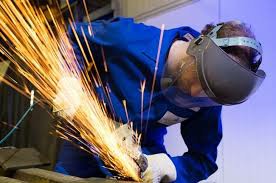Abrasive Wheels Certification: Understanding Risks, Workplace Hazards, and How to Stay Safe
Abrasive wheels are essential tools in various industries, from metal fabrication to woodworking. However, the power and speed with which they operate make them a significant safety hazard if not handled correctly. This blog aims to explore the risks associated with abrasive wheels, common injuries, and the best techniques to mitigate these dangers through proper training and safety measures.
The Risks of Working with Abrasive Wheels
Understanding the inherent risks is critical for ensuring a safe working environment. Here are the primary hazards associated with abrasive wheels:
- Wheel Breakage: Improperly mounted or worn wheels can shatter at high speeds, sending dangerous fragments toward operators and nearby workers.
- Improper Use: Many accidents occur due to improper usage techniques, including using the wrong type of wheel for the material or applying excessive force during cutting or grinding.
- Lack of Personal Protective Equipment (PPE): Operators not using appropriate PPE such as safety glasses, gloves, and face shields are at heightened risk of severe injuries.
- Poor Machine Maintenance: Neglecting regular machine checks can lead to malfunctions, increasing the likelihood of accidents.
- Inadequate Training: A workforce that lacks adequate training on the safe usage of abrasive wheels is vulnerable to mishaps.
Common Injuries Associated with Abrasive Wheels
The consequences of improper handling of abrasive wheels can range from minor injuries to severe accidents. Some of the most common injuries include:
- Cut and Laceration Injuries: Contact with the wheel can lead to deep cuts and lacerations on hands or other exposed body parts.
- Burns: The intense friction generated during cutting can cause burns on the skin.
- Eye Injuries: Flying debris can cause serious eye injuries, leading to permanent damage.
- Hearing Loss: Prolonged exposure to the high noise levels generated by abrasive wheel operations can lead to hearing impairment.
Mitigating Risks in the Workplace
Implementing safety measures can greatly reduce the risk of accidents associated with abrasive wheels. Here are some best practices to follow:
- Regular Inspections: Conduct routine checks of the abrasive wheels for signs of damage or wear before each use. Ensure proper mounting and alignment.
- Follow Manufacturer Guidelines: Always adhere to the manufacturer's specifications for speed, usage, and type of materials appropriate for each abrasive wheel.
- Proper Maintenance: Ensure equipment is well-maintained and serviced regularly to prevent malfunctions.
- Use of Personal Protective Equipment (PPE): Ensure all operators wear appropriate PPE, including safety goggles, gloves, and hearing protection.
- Conduct Regular Training: Training personnel to handle abrasive wheels correctly is critical. Conduct regular training sessions to keep safety knowledge up-to-date.
The Importance of Training and Certification
Obtaining an Abrasive Wheels Certificate enhances safety in the workplace and promotes compliance with safety regulations across Ireland. Accessible and reputable training providers in cities such as Dublin, Cork, Galway, and Limerick offer courses tailored to the needs of both workers and employers.
Benefits of Abrasive Wheels Certification
- Enhanced Safety Knowledge: Certification courses cover the essential safety measures, ensuring workers recognize potential hazards and act appropriately.
- Compliance with Regulations: Completing an abrasive wheels course helps organizations comply with Irish workplace safety regulations, reducing liability risks.
- Career Advancement: Certification can open doors for additional job opportunities and positions of greater responsibility.
Whether you're based in Limerick, Cork, Waterford, or any other city, seeking certified abrasive wheels training is crucial for anyone operating or managing tasks that involve these tools.
Conclusion
In summary, working with abrasive wheels carries inherent risks that can lead to severe injuries if not managed properly. By adhering to safety best practices, conducting regular risk assessments, and ensuring comprehensive training and certification, workplaces can significantly minimize the dangers associated with these powerful tools. To protect yourself and your colleagues, consider enrolling in an Abrasive Wheels Course Ireland today.
For more information on available courses and to secure your spot in a certified abrasive wheels training in Dublin, Cork, Galway, or Limerick, please visit our website or contact us at [email protected].



 349,500 Offered Certificates
349,500 Offered Certificates
 24/7 Online Training
24/7 Online Training
 Money Back Guarantee
Money Back Guarantee
 Fully Accredited Courses
Fully Accredited Courses
